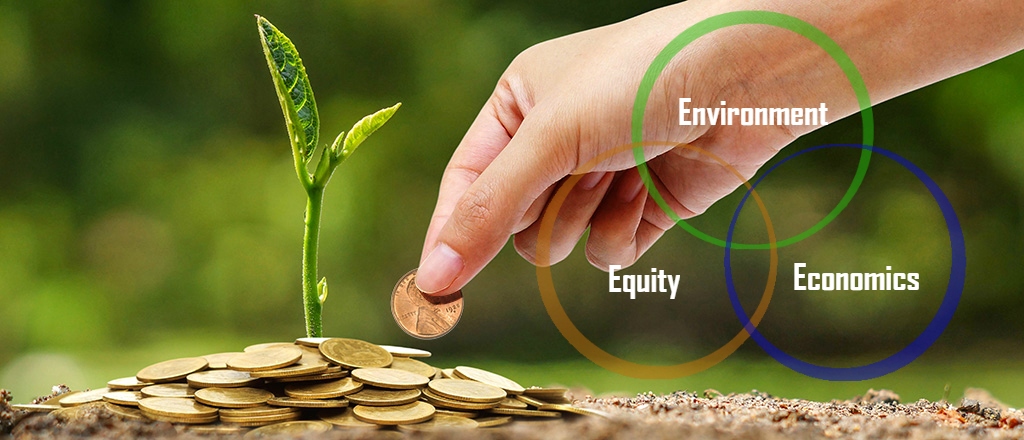Food sustainability goals are something we all need to think about. My family was among the first to recycle cans (back before you got paid for doing that) and we did a lot of paper drives when I was in Cub Scouts. Having grown up as an environmentalist, and even taking environmental studies courses in college, it’s great to see the topic of sustainability discussed in both corporate America and the general public.
The Three E’s of Sustainability
When discussing the viability of food sustainability goals, there’s often talk of the three Es: Economics, Equity and Environment. Together, these make the three legs of the food sustainability stool. However, when it comes to food sustainability, are all three elements in balance?
Lisa Benton-Short, a professor at George Washington University, took some time to discuss how these elements relate to food.
- For economic development, she mentioned things like fair trade, where payments and labor situations are just and equitable.
- For environmental, she cited a food system that minimizes green house gas emissions and uses water efficiently.
- Related to equity (sometimes referred to as social) she asks if food is affordable and accessible.
Most of us would agree these are all good and noble food sustainability goals, and there are companies who have even published information about their sustainability goals and practices. But are these food sustainability goals strategic to the company or merely good PR? If they’re not strategic, what’s preventing companies from making sustainability a priority?
The Barrier to Achieving Food Sustainability Goals
If the economics of food sustainability don’t make sense, it’s hard to make it a priority. While we all have a streak of altruism in us, we also have businesses to run and shareholders to satisfy. We see retailers making commitments to reduce energy use, for example, because it saves them money over time to install LED lights or put doors on refrigerated display cases. Some retailers are recycling unsaleable products instead of dumping them. But, there’s still a LOT of fresh food waste. What can we do to reduce or eliminate this waste? Is there a way to make the food supply chain more sustainable and do it in an economically viable manner?
We believe there is.
You know that, at Zest Labs, we’re all about the business of reducing food waste and improving sustainability. A third of the food the world grows ends up wasted. Problem is, you don’t know which third. When it comes to the three Es of sustainability, this has environmental, social equity and economic impacts. It’s currently a lose-lose-lose proposition. When we throw that food away:
- Environmental: We’re wasting the resources in terms of water, energy and labor that it took to grow, harvest, process and transport it and, if it goes into a landfill, that’s contributing to climate change.
- Social: People aren’t getting fed. This is both a local and a global problem. Food isn’t available or accessible to many of the people who need it.
- Economic: Costs go up. Rejected shipments mean truckers or growers eat the cost of the tossed product. Margins decrease for retailers, logistics providers and growers. This ultimately means prices go up or retailers go out of business. That may not mean much to you if you live in a major metropolitan area but if there’s no grocery store with fresh food for 30 miles, it’s a problem.
Our Zest Fresh solution can reduce waste at the retailer by 50% or more. By using predictive analytics, machine learning and IoT condition sensors, we can proactively determine the remaining freshness or shelf-life of each pallet of product. With that information you can intelligently route products based on that shelf life to ensure that it is always delivered to the retailer with sufficient freshness for sell through and customer satisfaction. This reduces waste by preventing it from happening in the first place. And it eliminates the cost of that waste. We can add 6% or more back into your product margins creating a financial incentive for retailers (and growers alike). Improving profitability also makes retailers more competitive, always a great thing but particularly important now, given the current market conditions with new discount competitors and increasing freight costs.
The food sustainability benefits of reducing waste:
- Environmental: We’re not wasting any of the resources used to produce and ship the product.
- Social: More food is being made available for people to eat.
- Economic: Costs go down, product margins go up…for the grower, the shipper and the retailer.
At Zest Labs, we make it profitable to be sustainable and do the right thing. Our customers save money by using our Zest Fresh solution and also offer better, fresher product to their customers. Growers can supply more food because more of their food is reaching more customers.
And, one other benefit: You don’t have to wait until 2020 or 2025 to implement this plan to help address your food sustainability goals. We help you reduce waste (and improve margins) from day 1.


